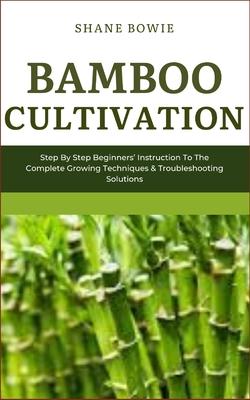
Book
Bamboo Cultivation: Step By Step Beginners Instruction To The Complete Growing Techniques & Troubleshooting Solutions
by Shane Bowie
(Write a Review)
Paperback
$9.30
Because of its adaptability and eco-friendliness, bamboo is highly prized for its many practical applications. Here are a few important things to know about bamboo and its uses:
- Rapid Expansion: Under ideal circumstances, several varieties of bamboo can grow several feet in a single day, earning the plant a reputation for its speedy expansion.
- In addition to its many building, furniture, paper, textile, and even edible uses, bamboo is a very adaptable material.
- Despite its low weight, bamboo possesses remarkable strength and flexibility. In the construction industry, it finds widespread use as flooring, scaffolding, and even house construction.
- Due to its fast growth rate and the fact that it can be collected without harming the plant, bamboo is seen as a sustainable material. Cultivating and harvesting this natural resource does not significantly harm the environment.
- Use in the Kitchen: You may eat the shoots of certain kinds of bamboo, and they're a staple in Asian cooking. These delicate young shoots are picked and put to use in a variety of recipes.
- Because of their lovely and graceful appearance, several kinds of bamboo are grown for decorative reasons in gardens and landscapes.
- For the purpose of controlling erosion, bamboo is useful for stabilizing slopes and avoiding landslides due to its large root system.
- The cultural importance of bamboo stems from its associations with virtues like resiliency, adaptability, and strength in many Asian countries.
It's important to remember that bamboo comes in a wide variety of shapes, sizes, and species. Furthermore, bamboo has a variety of applications in various fields and civilizations.
Because of its adaptability and eco-friendliness, bamboo is highly prized for its many practical applications. Here are a few important things to know about bamboo and its uses:
- Rapid Expansion: Under ideal circumstances, several varieties of bamboo can grow several feet in a single day, earning the plant a reputation for its speedy expansion.
- In addition to its many building, furniture, paper, textile, and even edible uses, bamboo is a very adaptable material.
- Despite its low weight, bamboo possesses remarkable strength and flexibility. In the construction industry, it finds widespread use as flooring, scaffolding, and even house construction.
- Due to its fast growth rate and the fact that it can be collected without harming the plant, bamboo is seen as a sustainable material. Cultivating and harvesting this natural resource does not significantly harm the environment.
- Use in the Kitchen: You may eat the shoots of certain kinds of bamboo, and they're a staple in Asian cooking. These delicate young shoots are picked and put to use in a variety of recipes.
- Because of their lovely and graceful appearance, several kinds of bamboo are grown for decorative reasons in gardens and landscapes.
- For the purpose of controlling erosion, bamboo is useful for stabilizing slopes and avoiding landslides due to its large root system.
- The cultural importance of bamboo stems from its associations with virtues like resiliency, adaptability, and strength in many Asian countries.
It's important to remember that bamboo comes in a wide variety of shapes, sizes, and species. Furthermore, bamboo has a variety of applications in various fields and civilizations.
Paperback
$9.30